The Press
Coloured News
By RANDOLPH S. CHURCHILL
LAST week I pointed out how the Illustrated London News had beaten its stable com- panion, the Sunday Times, with the first coloured photographs of Nehru's funeral. Of course, the colour supplement of the Sunday Times could have reproduced the picture simultaneously; but they don't come out till Sunday. In any case I now learn that Mr. Woodrow Wyatt's Birming- ham Planet beat them both with colour on the funeral. It was a smart piece of work.
* Strix should not be distressed that he has been pulled 'down a peg' by The Times who have relegated him from their birthday list. I was surprised that for two years in a row The Times printed my birthday, b4 I was blackballed this year by Sir William Daley. It does not surprise me as much as when ! Was included. After all, this is pure chicken-food for a paper which before the war tampered with reports it received from its Berlin correspondent in order not to offend Hitler, and which re-wrote its own lobby correspondent's account of Duff Cooper's resignation speech; and which in more recent times suppressed the noble and affectionate letter sent by the late President
Kennedy to Mr. Harold Macmillan last October. And there is always that story of Sir William's about 'pressure on space,' but I don't suppose Sir William had anything to do with it. Perhaps in the case of Strix, who is a former leader-writer on The Times, he may have. In my case I think it is probably just another example of Printing House Square mis-information. They reported that I had an operation on my lung in March and the Court Editor no doubt concluded that I was dead. (Wednesday's issue of The Times leaves me in some anxiety about the health of the Court Editor himself.) I expect that both Strix and I will look with idle curiosity to see whether we have been re-admitted to the cherished circle of Sir William's personal birthday honours list.
There seems to be great interest in the Observer transatlantic race. The Observer had an interest- ing story at the bottom of its back page last Sunday. As they have awarded the trophy they naturally take a special interest in it. By one of the most elegant scoops of the year the Sunday Times had a fine photograph on its front page' taken by the Royal Canadian Air Force • on Friday of Francis Chichester's boat, which appeared then to be among the front runners. The Observer had no photograph. It is these little touches which show. Fleet Street which papers are really on their toes.
*
In the correspondence column this week there is a letter from my friend Mr. Donald McLach- lan, editor of the Sunday Telegraph, complaining that I seem to derive more of my information for these notes from the Sunday Times than I do from his office. Some months ago (Spectator, January 17) when I wrote about the Sunday Telegraph's colour supplement on the Pope's visit to the Holy Land I telephoned to Mr. McLachlan seeking information about this pro- ject, and in particular as to how much it would cost. He said that he did not know but would find out and call me back. He never did. Since then, when writing about the Sunday press, I have naturally had to cast my net in other waters; but in the light of his friendly letter I shall certainly revisit my older fishing grounds. Incidentally, Mr. McLachlan kindly volunteers the informa- tion that his story about the typhoid epidemic in Aberdeen was written before the first edition of the Sunday Times was available. Then why did he hold it out from his first edition? As I sug- gested, it may have been through fear that the story would be 'lifted' by some unscrupu- lous competitor; but his letter casts no light on this.
* I hear, by the way, that the technical brain behind the forthcoming Daily Telegraph week- end colour supplement (to be published on Fridays) is the new general manager of the Tele- graphs, Mr. H. M. Stephen. He is a Beaverbrook- trained man, but graduated through the Sunday Times (where he was concerned with the launch- ing of its highly successful colour supplement) to his present position. It was his magisterial conception to attack the Observer on the flank on the Friday instead of by a frontal attack on the Sunday. But, of course, the decision was taken, as are all decisions on both Telegraphs, by their Editor-in-Chief for Life, Mr. Michael Berry. I hear that he has loftier ideas than the mere erosion of the Observer's revenues and readership —he aspires to be remembered as the great pioneering Editor-in-Chief who first introduced colour (other than straight advertising) into Fleet Street on a weekday.






























 Previous page
Previous page